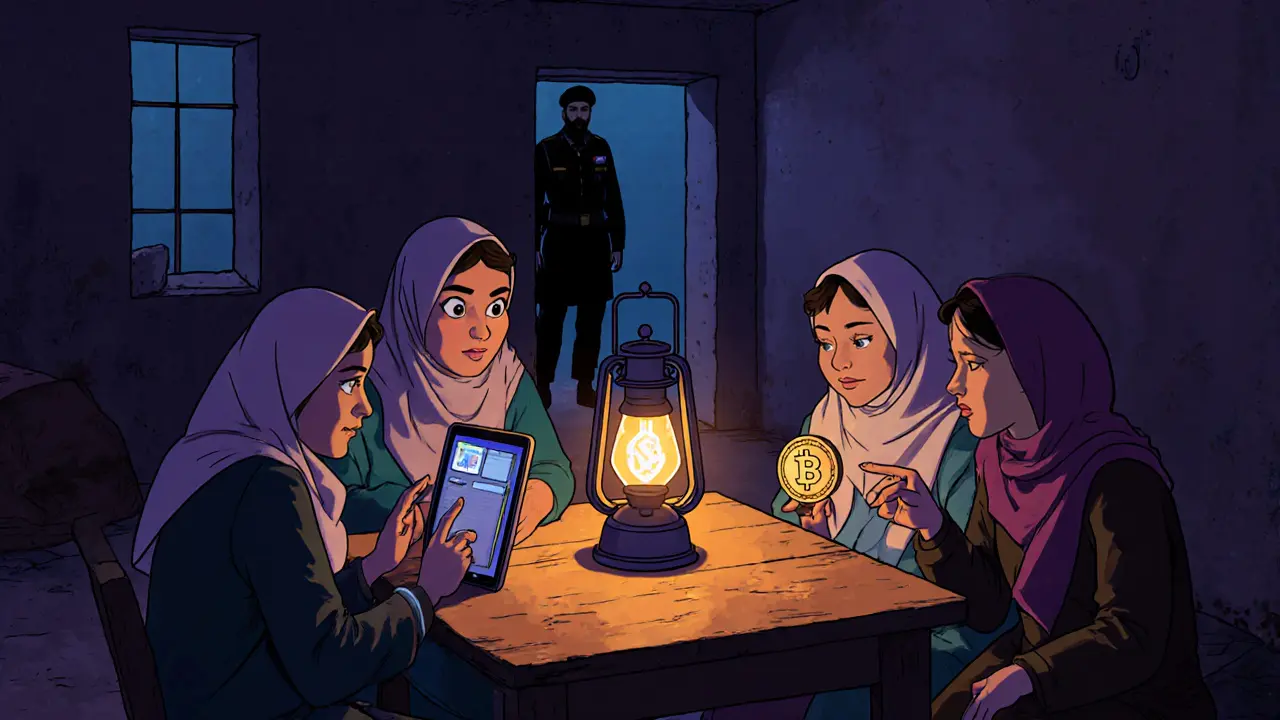Remittance Cost Calculator: Crypto vs. Traditional
Send Money to Afghanistan
Calculate how much you'd save by using crypto instead of traditional remittance services.
Why this matters: Traditional remittance services charge 30%+ fees ($150 for a $500 transfer), while crypto fees are typically under $10. This calculator shows the savings for Afghan families who rely on international money transfers.
Estimated Savings
| Method | Fee | Cost to Recipient |
|---|---|---|
| Traditional Remittance | $0.00 | $0.00 |
| Crypto Transfer | $0.00 | $0.00 |
| Savings | $0.00 |
* Based on 30%+ traditional fees (common for Afghan remittances) vs. $10 maximum crypto fees
Afghanistan cryptocurrency prohibition is the blanket ban the Taliban imposed on all digital‑asset activity in August 2022. The move shocked a nation that, just a year earlier, had jumped to the top‑20 of global crypto adoption despite having only about a fifth of its population online.
Quick Takeaways
- The Taliban declared crypto “haram” under its interpretation of Sharia law, citing speculation and lack of backing.
- Legal enforcement targets exchanges, miners, and traders, but peer‑to‑peer networks keep crypto flowing underground.
- Women and remittance‑dependent families rely on Bitcoin and USDT as a lifeline amid a collapsing banking system.
- Afghanistan is now one of only nine countries that still prohibit crypto, while most of the world is easing restrictions.
- Future reversal remains possible if economic pressure outweighs ideological concerns.
Why the Ban Came Down Hard
When the Taliban returned to power in 2021, international sanctions froze the country’s foreign reserves. With no official banking channels, Afghans turned to digital money to send money home, pay for school fees, and even buy food. By the end of 2021, Bitcoin transaction volume had risen to roughly $10 million per month, putting Afghanistan ahead of many larger economies.
That rapid uptake alarmed the new rulers. In their eyes, crypto was speculative gambling - a classic “maysir” activity prohibited by Sharia law. The Taliban issued an official statement in August 2022 labeling Bitcoin, Ethereum, and all other tokens as haram, and ordered the immediate shutdown of any domestic exchange.
The ban is not a soft‑regulation approach; it’s absolute. The legal text says any “trading, mining, or usage of cryptocurrency” is punishable by arrest, and the Ministry of Finance has suspended all licences for crypto‑related businesses.
Enforcement in Practice
Since the proclamation, Taliban security forces have carried out periodic crackdowns. In September 2022, a small Khorasan‑based exchange was raided, resulting in three arrests. In early 2023, a mining operation in Herat was shut down, with equipment confiscated.
However, the decentralized nature of crypto makes total eradication impossible. Peer‑to‑peer platforms like LocalBitcoins and Paxful continue to operate via encrypted messaging apps, often using VPNs to bypass internet throttling. Reports from 2024 indicate that monthly crypto transaction volume has settled around $80,000 - a tiny fraction of the 2021 peak, but still enough to move millions of dollars across borders.
Enforcement is further hampered by the Taliban’s limited technical capacity. Monitoring internet traffic in a country where only 8.6 million of 40 million people have reliable connectivity is a daunting task, especially when most activity happens on mobile data and through informal networks.
Underground Ecosystem: How Afghans Still Use Crypto
Despite the risk, crypto remains a lifeline. The most common route is a three‑step peer‑to‑peer flow:
- A relative abroad purchases Bitcoin on a regulated exchange.
- The Bitcoin is sent to a local Afghan dealer via a wallet address shared over Telegram.
- The dealer converts the Bitcoin into USDT (a stablecoin) or cash, handing it to the recipient.
This chain sidesteps any need for a local exchange, making it hard for authorities to trace. Women, who often cannot obtain official ID documents, rely heavily on this method. Roya Mahboob, founder of the Digital Citizen Fund, says that Bitcoin ownership has become “a quiet form of financial freedom” for many Afghan women who are otherwise barred from formal employment.
Remittance‑dependent families also use crypto to avoid the 30‑plus percent fees charged by informal money‑transfer operators. A single $500 transfer can cost $150 through a traditional hawala network, whereas the same amount moved via Bitcoin may incur less than $10 in transaction fees.

Humanitarian and Gender Dimensions
The United Nations warned in late 2022 that 97 percent of Afghans were sliding below the poverty line - a 25 percent jump from the previous year. With the formal banking sector crippled, crypto offers a rare bridge to the outside world. Yet the prohibition compounds gender inequality. Afghan women are denied bank accounts, land titles, and many forms of legal identification. Without those, they cannot open a crypto wallet on a regulated platform, forcing them into the risky underground market.
Digital Citizen Fund runs covert workshops teaching women how to secure a wallet, recognize phishing attempts, and safely store private keys. The organization partners with the Human Rights Foundation to channel small amounts of Bitcoin to participants, allowing them to purchase essential goods without a middleman.
Afghanistan in the Global Regulatory Landscape
According to Binance data, only nine countries still prohibit crypto outright, and Afghanistan is the newest addition. Most nations that once banned digital assets - Morocco (2024), Nigeria (2020) - have since softened their stance. The global trend is toward regulation, not prohibition.
That makes Afghanistan an outlier. While China maintains a strict ban, it has the technical resources to enforce it nationwide. Afghanistan’s enforcement is hampered by limited bandwidth, a fragmented power grid, and a largely informal economy. Experts argue that the ban is unsustainable unless the Taliban radically changes its economic policy.
Potential Paths Forward
Three scenarios could reshape the crypto scene in Afghanistan:
- Economic pressure forces a softening: Continued poverty and the need for remittances could push the Taliban to relax the ban, perhaps allowing only peer‑to‑peer transfers while still banning exchanges.
- International aid ties crypto compliance to assistance: Donor countries might demand a clear regulatory framework before releasing funds, incentivizing a limited legalisation.
- Strict enforcement persists: If the regime doubles down on ideological control, underground activity will become riskier, possibly driving users toward cash or barter.
At present, the Afghanistan crypto ban remains in place, but the underground market shows that digital money will not disappear as long as there is economic desperation.

Comparison: Crypto Landscape Before vs. After the Ban
| Metric | 2021 (Pre‑Ban) | 2023 (Post‑Ban) |
|---|---|---|
| Monthly transaction volume | ~$10 million | ~$80 000 (underground only) |
| Legal status | Unregulated but tolerated | Explicitly illegal under Sharia‑based decree |
| Number of active exchanges | 2-3 small local platforms | 0 (all shut down) |
| Enforcement actions | None | Arrests, equipment confiscation, internet throttling |
| Women’s financial access | Emerging via informal networks | Heavily reliant on underground P2P |
Frequently Asked Questions
Is it illegal to own Bitcoin in Afghanistan?
Yes. The Taliban’s 2022 decree classifies all cryptocurrency activities, including ownership, as prohibited under their interpretation of Sharia law.
How do Afghans still trade crypto despite the ban?
Most trading happens on peer‑to‑peer platforms accessed through encrypted messaging apps, VPNs, and mobile wallets. The lack of a central exchange makes detection harder.
What penalties can traders face?
Authorities have arrested traders, seized laptops and mining rigs, and imposed short‑term detention. Sentences can include up to several years in prison, though most cases result in brief detentions.
Are there any crypto‑friendly NGOs working in Afghanistan?
The Digital Citizen Fund, led by Roya Mahboob, runs discreet workshops teaching women how to use Bitcoin and stablecoins for remittances while staying under the radar.
Will the ban ever be lifted?
Analysts say a complete reversal is unlikely unless economic hardship forces the Taliban to relax the rule. A limited allowance for peer‑to‑peer transfers is more plausible.
What to Watch Next
If you’re following Afghanistan’s crypto story, keep an eye on three signals: a) any public statement from the Ministry of Finance about “financial inclusion”, b) changes in the volume of P2P trades reported by global analytics firms, and c) shifts in international aid packages that tie compliance to crypto regulation. Those clues will hint at whether the underground market will keep growing or if the Taliban will finally bow to economic reality.






Tom Glynn
Thinking about the Taliban's crypto ban makes you reflect on how technology collides with ideology; it's a classic case of progress meeting inertia 🌍. The ban tries to freeze digital freedom, yet the underground market shows resilience, a reminder that hope finds a way. Stay hopeful, folks – change is often a slow tide, but it does turn.
Johanna Hegewald
The ban makes it illegal to own Bitcoin, but people still use it through peer‑to‑peer apps. It’s simple: families send money from abroad, a dealer converts it, and the cash reaches those in need. The underground network keeps running because traditional banks aren’t an option.
Benjamin Debrick
One must, with a measured degree of intellectual rigor, observe that the Taliban’s decree is not merely a policy misstep; it epitomizes a doctrinaire adherence to a retrograde interpretation of Sharia-an interpretation that, frankly, eschews the nuanced realities of a digitized global economy; indeed, the attempt to arrest the flow of decentralized assets betrays a paradoxical yearning for control while simultaneously undermining the very economic substratum upon which the regime relies. One could argue, with no small amount of disdain, that such a prohibition is as effective as attempting to halt the tide with a sandcastle.
Anna Kammerer
Oh great, another ban that pretends to protect morals while starving people-how original. If the Taliban really cared about their citizens, they'd find a way to let crypto flow safely instead of playing moral police.
Mike GLENN
The underground crypto ecosystem in Afghanistan is a fascinating case study of adaptation under duress; families, especially women who lack official identification, turn to peer‑to‑peer channels, sending funds from relatives abroad through a three‑step process that has become almost ritualistic in its reliability.
First, a relative purchases Bitcoin on a regulated exchange, navigating KYC and compliance, then transfers the coins to a local dealer via encrypted messaging platforms such as Telegram, often employing VPNs to evade throttling.
Second, the dealer, acting as a trusted intermediary, converts the Bitcoin into USDT or cash, providing a lifeline that bypasses traditional hawala fees, which can exceed thirty percent.
Third, the recipient receives the stablecoin or cash, enabling payment for essentials like food, medical supplies, and school fees.
This loop persists because the decentralized nature of blockchain technology resists total eradication, and the Taliban's limited technical capacity-only a fraction of the population has reliable internet-makes comprehensive surveillance nearly impossible.
Moreover, the economic pressure is palpable: UN reports indicate a dramatic rise in poverty rates, so the incentive to maintain these networks outweighs the fear of legal repercussions.
In practice, enforcement actions such as raids on exchanges in Khorasan or confiscation of mining rigs in Herat have only temporarily disrupted activity, not annihilated it.
Local communities have adapted, using encrypted apps, shifting to less conspicuous stablecoins, and even employing steganographic techniques to hide transaction hashes.
The resilience of this system underscores a broader truth: when formal financial services crumble, people will engineer alternatives, however clandestine.
Women, historically denied access to banking, have become inadvertent pioneers of digital finance, fostering a quiet form of financial autonomy that challenges patriarchal constraints.
Humanitarian NGOs like the Digital Citizen Fund have amplified this effect by providing discreet workshops on wallet security, demonstrating that education coupled with technology can empower marginalized groups.
Nevertheless, the risk remains substantial; arrests, equipment seizures, and short‑term detentions are real, yet the community’s collective memory of these incidents fuels a cautious optimism.
In essence, the underground crypto market illustrates a microcosm of resistance: a blend of necessity, ingenuity, and a yearning for connection to the global economy.
As long as borders remain closed and traditional banks stay inaccessible, this digital lifeline will endure, constantly evolving to outpace the authorities' limited reach.
BRIAN NDUNG'U
Esteemed community, let us recognize the indomitable spirit of Afghans navigating adversity; their perseverance exemplifies the very essence of resilience. May their ingenuity inspire us to advocate for inclusive policies worldwide.
Tom Grimes
Honestly, I feel compelled to share a personal anecdote about my cousin who once tried to help a friend in Kabul with crypto, and we ended up being chased by local authorities for a week-yeah, that happened. It’s not just about economics; it’s also about the emotional weight of constantly looking over your shoulder. I understand the pain, but maybe we should all just step back and let them handle it themselves?
Paul Barnes
Sure, the ban is just a cover; the real control comes from shadowy global cabals that want to keep the poor strapped to fiat. Think about it.
John Lee
What’s really striking here is the human ingenuity-people turning obstacles into opportunities. The colorfully woven web of P2P trades reminds us that collaboration can bloom even in the harshest soils.
Jireh Edemeka
Ah, the elegance of a policy that claims moral superiority while ignoring basic human needs-truly a masterpiece of contradictory legislation.
del allen
lol thsi is so sad but also kinda epic 😂 i cant believe they still try to stop ppl from sending money to family lol
Jon Miller
Drama alert! The world’s newest “no‑crypto zone” is turning into a secret bazaar-talk about a plot twist worthy of a thriller!
Rebecca Kurz
Wow-another government trying to control the future; certainly not a surprise; maybe next they’ll ban pens too...?
Nikhil Chakravarthi Darapu
Our nation’s sovereignty is threatened every time foreign powers push their crypto agendas.
Tiffany Amspacher
In the grand theater of global finance, the Taliban’s ban is but a fleeting act-yet it provides the most riveting monologue about power versus freedom.
Ty Hoffer Houston
It’s inspiring to see how cultural resilience can turn a restrictive policy into a catalyst for community innovation. Let’s celebrate these quiet heroes who keep the world connected.